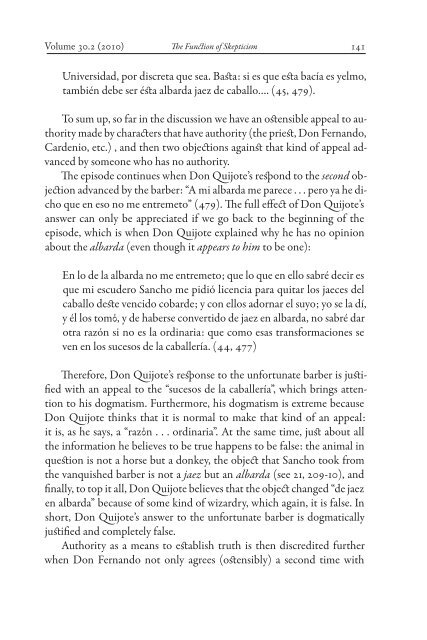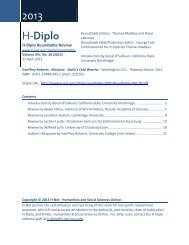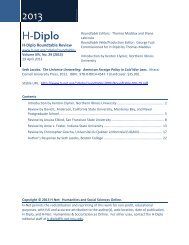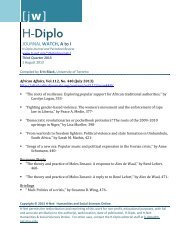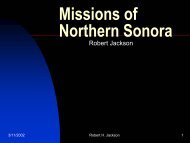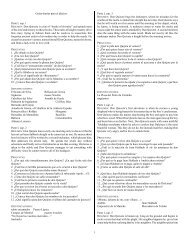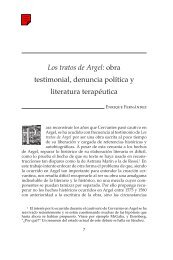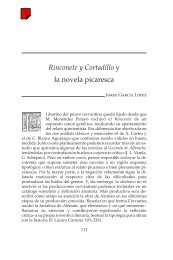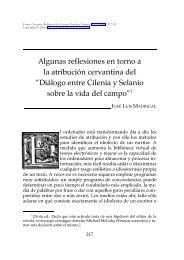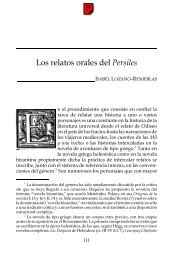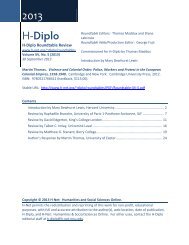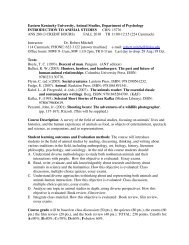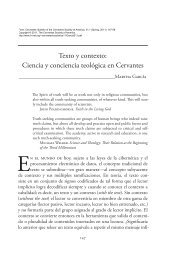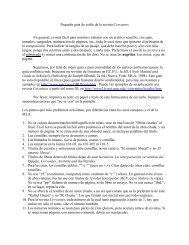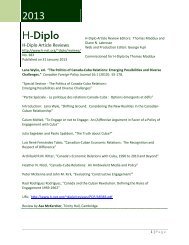The Function of Skepticism in Part I of Don Quijote - H-Net
The Function of Skepticism in Part I of Don Quijote - H-Net
The Function of Skepticism in Part I of Don Quijote - H-Net
Create successful ePaper yourself
Turn your PDF publications into a flip-book with our unique Google optimized e-Paper software.
Volume 30.2 (2010) <strong>The</strong> <strong>Function</strong> <strong>of</strong> <strong>Skepticism</strong><br />
141<br />
Universidad, por discreta que sea. Basta: si es que esta bacía es yelmo,<br />
también debe ser ésta albarda jaez de caballo…. (45, 479).<br />
To sum up, so far <strong>in</strong> the discussion we have an ostensible appeal to authority<br />
made by characters that have authority (the priest, <strong>Don</strong> Fernando,<br />
Cardenio, etc.) , and then two objections aga<strong>in</strong>st that k<strong>in</strong>d <strong>of</strong> appeal advanced<br />
by someone who has no authority.<br />
<strong>The</strong> episode cont<strong>in</strong>ues when <strong>Don</strong> <strong>Quijote</strong>’s respond to the second objection<br />
advanced by the barber: “A mi albarda me parece . . . pero ya he dicho<br />
que en eso no me entremeto” (479). <strong>The</strong> full effect <strong>of</strong> <strong>Don</strong> <strong>Quijote</strong>’s<br />
answer can only be appreciated if we go back to the beg<strong>in</strong>n<strong>in</strong>g <strong>of</strong> the<br />
episode, which is when <strong>Don</strong> <strong>Quijote</strong> expla<strong>in</strong>ed why he has no op<strong>in</strong>ion<br />
about the albarda (even though it appears to him to be one):<br />
En lo de la albarda no me entremeto; que lo que en ello sabré decir es<br />
que mi escudero Sancho me pidió licencia para quitar los jaeces del<br />
caballo deste vencido cobarde; y con ellos adornar el suyo; yo se la dí,<br />
y él los tomό, y de haberse convertido de jaez en albarda, no sabré dar<br />
otra razón si no es la ord<strong>in</strong>aria: que como esas transformaciones se<br />
ven en los sucesos de la caballería. (44, 477)<br />
<strong>The</strong>refore, <strong>Don</strong> <strong>Quijote</strong>’s response to the unfortunate barber is justified<br />
with an appeal to the “sucesos de la caballería”, which br<strong>in</strong>gs attention<br />
to his dogmatism. Furthermore, his dogmatism is extreme because<br />
<strong>Don</strong> <strong>Quijote</strong> th<strong>in</strong>ks that it is normal to make that k<strong>in</strong>d <strong>of</strong> an appeal:<br />
it is, as he says, a “razόn . . . ord<strong>in</strong>aria”. At the same time, just about all<br />
the <strong>in</strong>formation he believes to be true happens to be false: the animal <strong>in</strong><br />
question is not a horse but a donkey, the object that Sancho took from<br />
the vanquished barber is not a jaez but an albarda (see 21, 209-10), and<br />
f<strong>in</strong>ally, to top it all, <strong>Don</strong> <strong>Quijote</strong> believes that the object changed “de jaez<br />
en albarda” because <strong>of</strong> some k<strong>in</strong>d <strong>of</strong> wizardry, which aga<strong>in</strong>, it is false. In<br />
short, <strong>Don</strong> <strong>Quijote</strong>’s answer to the unfortunate barber is dogmatically<br />
justified and completely false.<br />
Authority as a means to establish truth is then discredited further<br />
when <strong>Don</strong> Fernando not only agrees (ostensibly) a second time with


